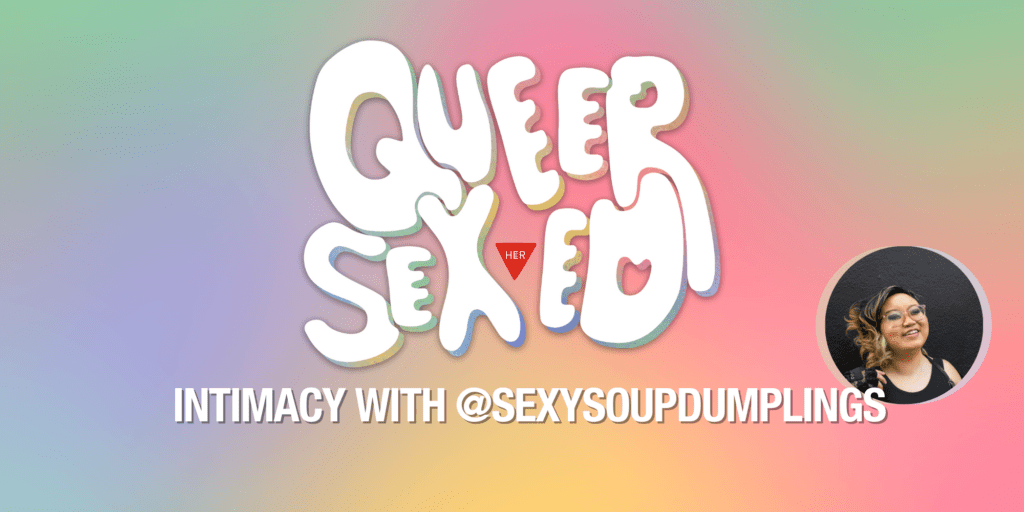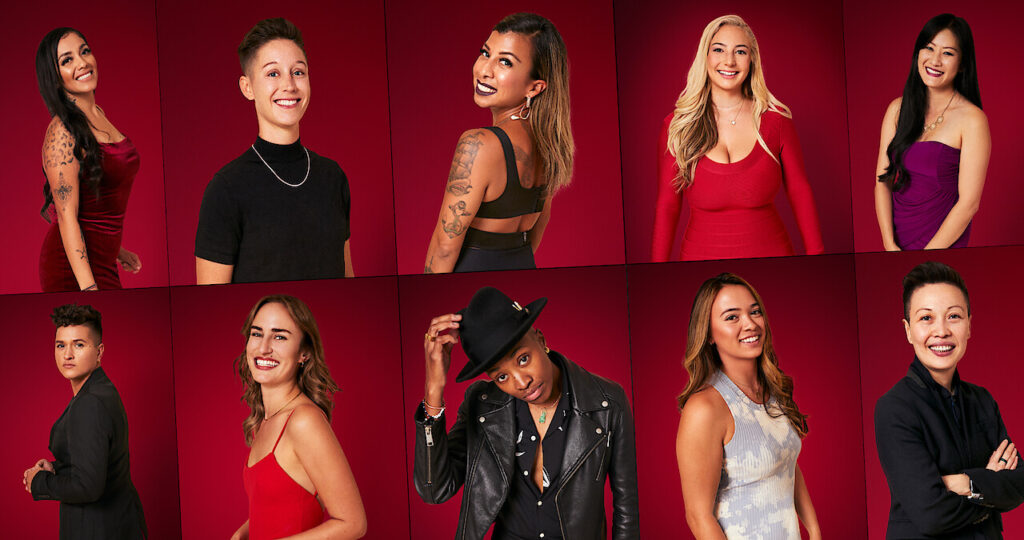Sydney, @sexysoupdumplings on Instagram, is a non-monogamous sex educator who holds space through intuitive guidance. They are a polyamorous, bisexual, non-binary, genderqueer femme and have been practicing different forms of non-monogamy for several years – with polyamory being their most recent exploration.
We got the opportunity to talk to Sydney about intimacy, and their recommendations for how queer folks can navigate all kinds of intimacy – platonic included. Below is a deep dive into a few of the topics we covered. And to hear more from Sydney, you can also check them out Live with us on Instagram – February 14 3:30 PST / 6:30EST.
Love is definitely the theme of Valentine’s Day, but let’s talk about how to do it right, in whatever way you decide to love!
Sydney’s Thoughts on Intimacy
HER: How did you become Sexy Soup Dumplings?
I’m a queer/bisexual, polyamorous, genderqueer, non-binary femme who grew up in a 3rd generation Chinese-American, Catholic household. I use they/she pronouns. I practice non-hierarchical polyamory (meaning there’s some structure as well as room to explore) and consider myself leaning towards relationship anarchy.
I’ve been practicing some form of non-monogamy since 2018, but have only been actively practicing polyamory for the last 8 months. My partnerships are both romantic/sexual as well as queerplatonic. For me, non-hierarchical polyamory looks like an anchor partner/nesting partner (we live together) with partners outside of that who don’t live with me. With my anchor partnership, we are more logistically linked to typical relationship milestones (meet-the-parents, etc), while my other partnerships have different logistical expectations. While there is no explicit prioritization, there is a descriptive hierarchy due to the fact that my anchor and I live together.
With my anchor partnership, we are more logistically linked to typical relationship milestones (meet-the-parents, etc), while my other partnerships have different logistical expectations.
I’m a non-monogamy sex educator, which wasn’t the path I expected to take when I jumped into sex education in March 2020. Upon my therapist’s and a reiki healer’s encouragement, I began to dabble in sex education. Originally, I began doing survivorship work combined with intuition (think oracle cards and reiki) as I’m a survivor of intimate partner/sexual violence. When I began to share my survivorship journey as well as healing tools, I felt so empowered. Ultimately, pursuing sex education made me feel less alone – through learning and holding space for others, I began to make sense of what happened to me.
But survivorship work, although rewarding, quickly became draining. I started to explore non-monogamy more within therapy sessions. While exploring non-monogamy personally, I found unpacking non-monogamy in an educational context really exciting and fulfilling. Non-monogamy is personally liberating and a relationship structure that has helped me heal from intimate partner violence.
As I was undergoing personal changes as well as career pivots, I decided to rename my Instagram to @sexysoupdumplings after a conversation with my queerplatonic partner. The name came from trying to come up with food-related puns or alliterations. I’m a big dumpling lover, so soup dumplings felt aligned! Prior to pursuing sex education, I went to film school at Emerson College, so some of my content centers around media representation as I love to nerd out on movies and television!
During my time at Emerson, my love for sex-ed and holding space through conversation really sprouted. As an undergraduate student, I was part of intercultural student leadership some roles where I held space for conversations around self-care and identity. In my last semester, I collaborated with graduate students to create a curriculum advocating for consent and intimacy coordination as a final project. With them, we all collaborated to create ways for the college to implement safer on-set code conduct to prevent sexual violence. We even sent our findings to the Visual Arts and Performing Arts departments for review! This project, many thanks to my professor Miranda Banks, were the buds for where I am now within the sex-ed realm.
HER: How would you define intimacy?
I would define intimacy as more than just physical. I believe it’s about creating emotional space within our relationships. A huge part of intimacy is creating emotional consent within dating especially. Emotional consent is checking in on those you’re seeing, dating, or in a relationship with if they have the mental capacity for heavy conversations. I also want to credit my therapist Anna for helping me learn and embody this concept. With rape culture so embedded within hetero-normative standards we’re taught from birth, a lot of us forget about the importance of emotional consent.
Oftentimes, society and the media views intimacy solely as sexual when there are ways intimacy shows up in our lives beyond the boxes we’re taught.
Oftentimes, society and the media views intimacy solely as sexual when there are ways intimacy shows up in our lives beyond the boxes we’re taught. My queerplatonic partnership has taught me a lot about how to view intimacy beyond the boxes given by society. I believe that friendships can be romantic as well as partnerships too (if people want to go that route). With an expanded version of intimacy in mind, dating is a playground. So have your inner child play around and explore!
HER: How can queer folks build emotional intimacy?
I believe queer folks can build emotional intimacy through unlearning the ideas of intimacy we’ve been taught by hetero-normative standards. Standards like the idea that intimacy is only reserved for romantic relationships or that you can’t kiss your friends. Nah! Like kiss and hold your friends’ hands if they consent! Queering our relationship spaces is what I think is a huge key to building emotional intimacy.
Nah! Like kiss and hold your friends’ hands if they consent!
I also believe undoing the rape culture we’ve been taught is a big part of building emotional intimacy too; emotional consent is sooo important! It has deepened my relationships in so many ways when I’ve incorporated it into my life. Building this within all your relationship spaces (not just the romantic partnerships) creates fulfilling connections. I also believe in giving those you love feedback (with their consent) – it often helps build emotional intimacy. I do acknowledge that asserting boundaries and naming feedback can be hard – especially if you’ve dealt with relationship-based traumas. It might be hard at first (it was for me), but it’s so worth it! All my relationships have benefited from feedback and emotional consent; I personally think it’s healing especially for those of us who live with inter-generational traumas.
By doing both in tandem, I believe queer folks can build emotional intimacy within their relationship spaces.
HER: What are tips for creating physical, non-sexual intimacy?
I’m a huge fan of platonic intimacy! Ask your friends if they want to hold hands or kiss. I feel like romantic friendships are a relationship that isn’t often talked about, but needs to be talked about more! Platonic intimacy has added so much value to my life!
Cuddling with friends is really underrated, but I think some of the sweetest acts of friendship. Ask your friends to cuddle! I remember having cuddle puddles in college; those were seriously some of the most joyful moments with my friends. With the pandemic still happening, I believe we all could benefit from platonic intimacy more.
Doing activities together (as a couple) or as a group (if you’re in a polycule or non-monogamous formation) can create physical, non-sexual intimacy.
Beyond that, doing activities together (as a couple) or as a group (if you’re in a polycule or non-monogamous formation) can create physical, non-sexual intimacy. Making meals with a partner(s) is not only a cute thing to do, but I’ve found it also creates physical intimacy! Whether you’re baking up some cookies together or whipping up some risotto, cooking helps not only with physical intimacy but also can help teach you how to communicate better with your partner(s). Personally, I love when I get to hug my partner(s) from behind while we’re waiting on food to cook. However, it doesn’t have to be cooking if you’re not into that. It could be rock climbing or fruit picking or bowling or stargazing – whatever your heart desires!
Much like sexual intimacy, carving out time for physical, non-sexual intimacy helps create a deeper sense of physical intimacy within relationship spaces. It helps to have something to look forward to after a task or a long day of work.
These are just some ways from my personal experience I’ve found that have helped create physical, non-sexual intimacy within my relationships. Feel free to take what resonates for you from this!
HER: What are ways queer folks can build sexual intimacy?
As weird as this might sound, one way to build sexual intimacy through partnerships is having tough conversations that might be emotionally uncomfortable. It’s deepened my anchor partnership a lot especially as we’ve had conversations around navigating jealousy or even tough logistical things like finances. After the conversations, we usually cuddle or watch a funny movie while cuddling to create space from the discussion. Sometimes, we have a goal of sexual aftercare (but not always as it depends on the conversation). These conversations have led to really steamy sex sessions! It’s truly been some of the best sex of my life thus far!
I also want to acknowledge these conversations are hard to have, especially if you’re someone with relationship-based traumas. Even I have had nerves around those tough conversations before they happened. It’s completely normal to feel this way! You’re not alone; I understand that it might be awkward and uncomfortable at first. Something I learned many years ago at SDLC (the Student Diversity Leadership Conference led by Rodney Glasgow) is to lean into discomfort. I bring that value into my interpersonal relationships within conversations; I think it creates deeper emotional intimacy which leads to deeper sexual intimacy.
As weird as this might sound, one way to build sexual intimacy through partnerships is having tough conversations that might be emotionally uncomfortable.
I’ve found experimenting with new ways in the bedroom has built my sexual intimacy within my partnerships. It’s both fun and has given room for partners to explore what works for them as well as me. I’ve also discovered new sides of myself through experimentation – as have my partners!
Another way I’ve found from personal experience is to sometimes schedule sex into the week. Under the stress of capitalism, scheduling sex can build sexual intimacy – plus it gives you something to look forward to! I know it sounds kind of weird, but it does work wonders. On the opposite side of the spectrum, spontaneous unplanned sex can also build sexual intimacy. There are endless ways to build sexual intimacy beyond the ones listed above, but this is what I’ve found has worked in my personal experience. Take what resonates and leave what doesn’t!
HER: How can queer folks best navigate intimacy?
Intimacy doesn’t have to look like what the media portrays – which is something to think on as queer folks try to navigate intimacy. Platonic intimacy, not often discussed, is so powerful and can create empowerment for yourself. Intimacy is not a one size fits all box, which is honestly the beautiful thing about it.
I also want to say that it’s okay if navigating intimacy is hard, especially if you’re someone with relationship-based traumas. It’s okay for it to feel uncomfortable or for there to be some discomfort at first while you settle into new patterns.
I also want to say that it’s okay if navigating intimacy is hard, especially if you’re someone with relationship-based traumas.
Something I wish someone told me as a young queer is that you don’t have to be perfect when navigating intimacy. Unlearning what we’re taught around intimacy is super hard! It’s a learning experience, which is the beautiful part of it. Don’t be too hard on yourself if you don’t get it the first time. You deserve as much compassion as you’d give to someone else.
At the end of the day, find what works best for you. What works for you will look different from what works for someone else. There’s no cookie-cutter way to go about navigating intimacy as we all come with different lived experiences, privileges, and so forth.
Join us as we chat more with Sydney on Instagram
Sydney will be joining us on February 14 to talk more about Intimacy Live on Instagram at 3:30pm PST / 6:30pm EST.
Schedule a reminder to listen in







